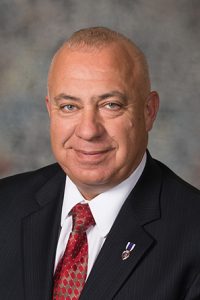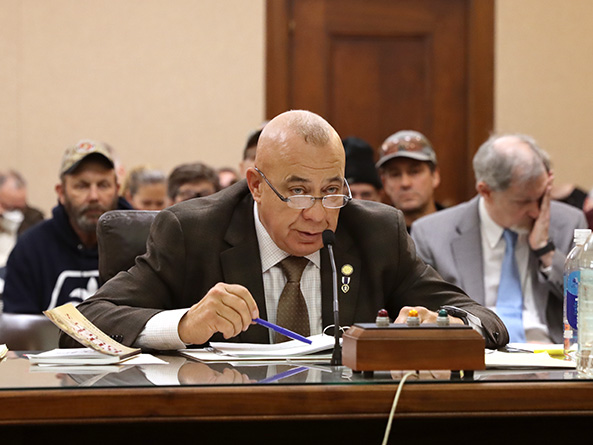Bill would eliminate concealed handgun permit requirement
The Judiciary Committee heard testimony Jan. 20 on a bill that would allow Nebraskans to carry a concealed handgun without a permit.

Current state law requires that an individual pass a background check, submit a $100 permit fee and complete a gun safety course to obtain a concealed carry permit.
LB773, introduced by Gordon Sen. Tom Brewer, would prohibit counties, cities and villages from regulating the ownership, possession and transportation of a concealed handgun. Under the bill, permits and training requirements for concealed handguns no longer would be mandatory.
Individuals who currently are prohibited from possessing or carrying a gun still would be prohibited from doing so under the bill. Carrying a concealed handgun while under the influence of alcohol also would remain illegal. Concealed handguns would remain prohibited in schools, certain government premises and private businesses that have such rules in place.
Brewer said that concealed carry permits still would be available and may be desirable because they would allow an individual to carry a gun across state lines. But permits shouldn’t be mandated, he said.
“Bad people will still do bad things, but what we’re trying to do is provide people the right [to bear arms] that they’re entitled to,” Brewer said. “A person who has never done anything wrong and wishes to protect themself or their family can do that [under LB773] without fear of having an offense go on their record,” Brewer said.
Several individuals who spoke in favor of the bill expressed concern that current state law puts low-income individuals at a disadvantage in exercising a constitutional right due to the high cost of obtaining a concealed carry permit.
Testifying in support of LB773 was Jon Anderson of Norfolk. For most Nebraskans, he said, the right to self-defense has become especially important in the wake of increased incidents of riots and protests in recent years.
“If a person is lawfully able to purchase a handgun and pass a background check, and that person already has the lawful ability to carry that gun in the open, why can that same person not be trusted to carry that same handgun under their jacket or shirt?” Anderson said.
John Lott, a gun rights advocate, also testified in support of the bill. An individual in immediate danger, such as a woman being stalked, must wait up to 45 days to receive a permit, he said, which may be too late. In addition, he said, low-income individuals would benefit the most from being able to protect themselves.
“The very people that my research indicates would benefit the most from having a gun for protection [are] poor minorities who live in high crime urban areas,” Lott said.
David Babcock, former Adams County Deputy Attorney, also spoke in favor of the bill.
“We now live in an era of skyrocketing rates of homicide, carjacking and other violent crimes,” he said. “The surging crime rate shows us that many criminals already carry guns, and they will use their weapons when they believe they … won’t get caught.”
Matthew Mammoser testified on behalf of the National Association for Gun Rights in support of LB773. He said that states that have passed “constitutional carry” laws – as proponents refer to efforts to remove concealed carry restrictions – have lower violent crime and murder rates.
“Allowing law-abiding citizens to carry their firearm concealed without government intrusion reduces crime,” Mammoser said. “[The bill] doesn’t allow anyone to carry a weapon if they cannot legally possess one, [and] criminals will not suddenly be able to carry a gun.”
Those in opposition to LB773 expressed concern that the bill would undermine the police’s ability to de-escalate dangerous situations and would ease a criminal’s ability to obtain a gun.
Anthony Conner testified against the bill on behalf of the Omaha Police Officers Association. He said the Omaha Police Department has seized hundreds of illegal firearms from the city’s most dangerous gang members in recent years, which has led to fewer shootings and homicides.
“We believe this bill provides multiple unintended loopholes for criminals, gang members, irresponsible gun possessors and other prohibited persons to avoid prosecution,” Conner said. “This bill will hinder our officers’ ability to remove firearms from dangerous situations and individuals.”
Lincoln Police Chief Teresa Ewins also testified in opposition to the bill. She said citizens should prioritize calling 911 in dangerous situations because, without proper training, it’s possible for an individual to miscategorize a situation.
“Without a permitting process and training, you’ll have individuals who shouldn’t be carrying, and carrying without the proper skills necessary to assess a situation and determine when the lethal force is lawful,” Ewins said.
The committee took no immediate action on LB773.


